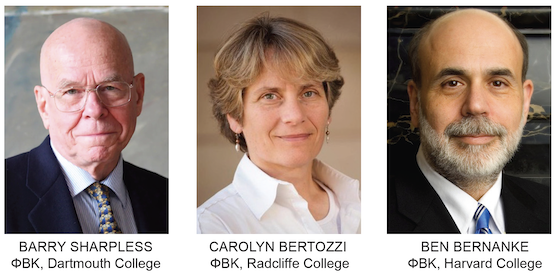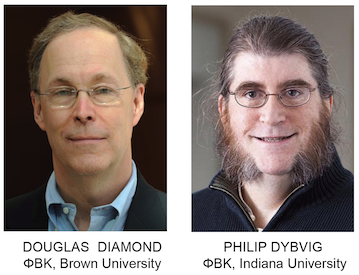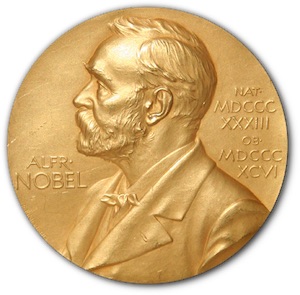The Phi Beta Kappa Society is pleased to recognize five of its members among this year’s Nobel Prize winners.
Three Laureates share this year’s Nobel Prize in Chemistry, and two of them are Phi Beta Kappa members: Barry Sharpless (ΦBK, Dartmouth College), Morten Meldal, and Carolyn Bertozzi (ΦBK, Radcliffe College).
Chemists have long been driven by the desire to build increasingly complicated molecules. In pharmaceutical research, this has often involved artificially re-creating natural molecules with medicinal properties. This has led to many admirable molecular constructions, but these are generally time consuming and very expensive to produce.
Sharpless, who received his first Nobel Prize in Chemistry in 2001, started the ball rolling. Around the year 2000, he coined the concept of “click chemistry,” a form of simple and reliable chemistry where reactions occur quickly and unwanted byproducts are avoided.
Shortly afterwards, Meldal and Sharpless (independently of each other) presented what is now the crown jewel of click chemistry: the copper catalyzed azide-alkyne cycloaddition. This is an elegant and efficient chemical reaction that is now in widespread use. Among many other uses, it is employed in the development of pharmaceuticals, for mapping DNA, and creating materials that are more fit for purpose.
Bertozzi, however, took click chemistry to a new level. To map important but elusive biomolecules on the surface of cells (glycans), she developed click reactions that work inside living organisms. Her bioorthogonal reactions take place without disrupting the normal chemistry of the cell.
These reactions are now used globally to explore cells and track biological processes. Using bioorthogonal reactions, researchers have improved the targeting of cancer pharmaceuticals, which are now being tested in clinical trials.
Click chemistry and bioorthogonal reactions have taken chemistry into the era of functionalism, bringing the greatest benefit to humankind.
Three Laureates also share the 2022 Nobel Prize in Economic Sciences. All are Phi Beta Kappa members: Ben Bernanke (ΦBK, Harvard College), Douglas Diamond (ΦBK, Brown University), and Philip Dybvig (ΦBK, Indiana University). Together, they have significantly improved our understanding of the role of banks in the economy, particularly during financial crises. An important finding in their research is why avoiding bank collapses is vital.
Modern banking research clarifies why we have banks, how to make them less vulnerable in crises, and how bank collapses exacerbate financial crises. The foundations of this research were laid by Bernanke, Diamond, and Dybvig in the early 1980s. Their analyses have been of great practical importance in regulating financial markets and dealing with financial crises.
For the economy to function, savings must be channeled to investments. However, there is a conflict here: savers want instant access to their money in case of unexpected outlays, while businesses and homeowners need to know they will not be forced to repay their loans prematurely. In their theory, Diamond and Dybvig show how banks offer an optimal solution to this problem. By acting as intermediaries that accept deposits from many savers, banks can allow depositors to access their money when they wish, while also offering long-term loans to borrowers.
However, their analysis also showed how the combination of these two activities makes banks vulnerable to rumors about their imminent collapse. If a large number of savers simultaneously run to the bank to withdraw their money, the rumor may become a self-fulfilling prophecy: a bank run occurs, and the bank collapses. These dangerous dynamics can be prevented through the government providing deposit insurance and acting as a lender of last resort to banks.
Diamond demonstrated how banks perform another societally important function. As intermediaries between many savers and borrowers, banks are better suited to assessing borrowers’ creditworthiness and ensuring that loans are used for good investments.
Bernanke analyzed the Great Depression of the 1930s, the worst economic crisis in modern history. Among other things, he showed how bank runs were a decisive factor in the crisis becoming so deep and prolonged. When the banks collapsed, valuable information about borrowers was lost and could not be re-created quickly. Society’s ability to channel savings to productive investments was thus severely diminished.


Congratulations to our ΦBK Nobel laureates! Read more about their research and all of the 2022 winners at nobelprize.org.
This announcement for Phi Beta Kappa winners is taken from official press releases provided by the Nobel organization.




